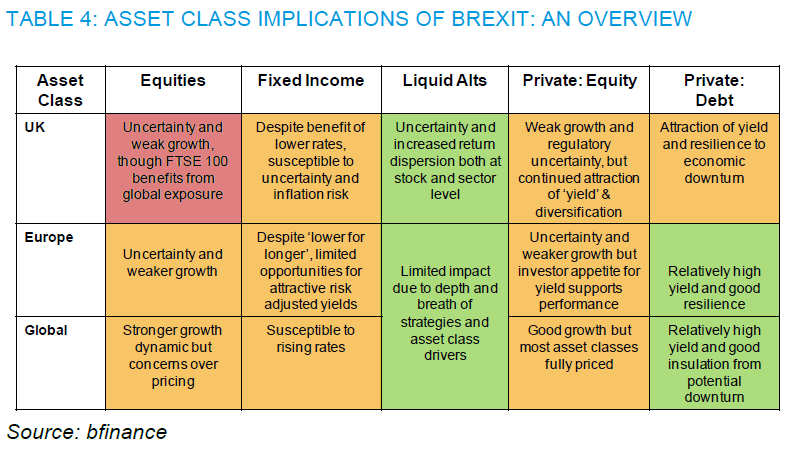Winners in a Post-Brexit World
Liquid alternatives and private debt could be the two big winners over the next 12 months in the aftermath of the UK’s decision to leave the European Union (EU), according to a report from bfinance.
In the two months since the landmark referendum result was announced on June 24, the initial shock has been replaced by cautious optimism in major investment markets. The biggest UK, US, and European equity markets have all rebounded to above their pre-referendum levels despite major sell-offs in the two trading days after the vote.
However, as UK politicians return from their summer break and attention again turns to the detail of how the country will extricate itself from the EU, bfinance predicted higher levels of volatility and stock-level dispersion. This would benefit many liquid alternatives strategies, the consultancy firm said.
The broad spectrum of private debt would benefit from its own higher yield compared with listed government and corporate bonds, bfinance said, as well as “the reduced competition from banks and the resilience to a downturn in values.”
“This is particularly the case for more senior debt and less so for higher yield or mezzanine debt that has less of a cushion to protect loans from value declines,” the consultant reported.
Bfinance also predicted that investors may focus on the “most resilient” asset classes during the expected period of policy uncertainty, “rather than taking on risks to exploit the opportunities generated by any dislocations.”
In private equity, the consultant warned of regulatory uncertainty and weaker growth prospects, but added that yield and diversification benefits would likely continue to attract investors.
 Both general
partners (GPs) and limited partners (LPs) are likely to become more focused on
currency exposures, according to a separate report from Aberdeen Asset
Management’s private equity team. Sterling fell by more than 10% versus the
US dollar between June 23 and September 5, and the euro also fell.
Both general
partners (GPs) and limited partners (LPs) are likely to become more focused on
currency exposures, according to a separate report from Aberdeen Asset
Management’s private equity team. Sterling fell by more than 10% versus the
US dollar between June 23 and September 5, and the euro also fell.
“We believe that LPs will assess their exposure to sterling-denominated investments and consider whether this is appropriate in the post-Brexit environment,” the report added. “Similarly, underlying portfolio companies with significant exposure to the UK economy will be analyzed by GPs as these may be adversely affected, reducing valuations and extending hold periods.”
One private equity group was already seeking a lower price for an acquisition as a direct result of the Brexit vote, according to Aberdeen. “Given the elevated pricing in the current private equity market, any moderation in entry prices could be a helpful development in the medium term,” the fund manager added.
The FTSE 100, S&P 500, and EuroStoxx 50 equity indexes all fell sharply on June 24. However, each benchmark has rebounded: the EuroStoxx rose 14.4% in local currency terms since June 27, while the FTSE 100 rose 12.1%.
The UK 10-year government bond yield has halved since the referendum to 0.685%. The yield fell through 1% on June 27 for the first time on record. The US 10-year treasury bond yield also fell in the poll’s aftermath.
Collapsing yields and ultra-low interest rates have hit UK pensions hard, with the aggregate deficit of the country’s 350 biggest funds reaching £189 billion ($251.6 billion) at the end of August, according to Mercer. Aggregate liabilities are approaching £1 trillion, the consultancy firm added, following an 8.2% rise during August.
Related: The UK’s Post-Brexit Pension Policymakers & What Brexit Means for LDI
